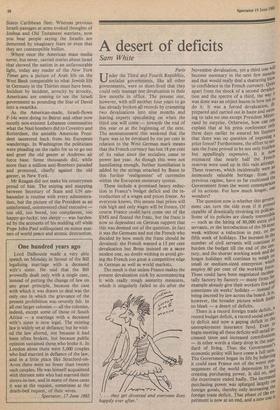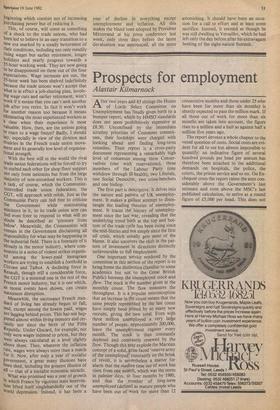A desert of deficits
Sam White
Paris Under the Third and Fourth Republics, socialist governments, like all other governments, were so short-lived that they could only manage one devaluation in their few months in office. The present one, however, with still another four years to go has already broken all records by cramming two devaluations into nine months and leaving experts speculating on when the third one will come — towards the end of this year or at the beginning of the next. The announcement this weekend that the franc was to be devalued by ten per cent in relation to the West German mark means that the French currency has lost 18 per cent of its value since the socialists came to power last year. As though this were not humiliating enough, further humiliation is added by the strings attached by Bonn to this further 'realignment' of currencies within the European monetary system.
These include a promised heavy reduc- tion in France's budget deficit and the in- troduction of a wages and prices freeze. As everyone knows, this means that prices will ride high and only wages will be frozen. Of course France could have come out of the EMS and floated the franc, but the franc is now so dependent on German support that this was deemed out of the question. In fact it was the Germans and not the French who decided by how much the franc should be devalued: the French wanted a 15 per cent devaluation but Bonn insisted on a more modest one, no doubt wishing to avoid giv- ing the French too great a competitive edge in German as well as world markets.
The result is that unless France makes the present devaluation stick by accompanying it with really tough austerity measures, which it singularly failed to do after the
. they get divorced and everyone lives happily ever after.' November devaluation, yet a third one will become necessary in the next few months and that would really deal a shattering blow to confidence in the French currency. Quite apart from the shock of a second devalua- tion and the spectre of a third, the waY It was done was an object lesson in how not t° do it. It was a forced devaluation, ill" prepared and carried out in haste and sea' ing to take no one except President Mittel." rand by surprise. Otherwise, how can one explain that at his press conference only three days earlier he assured his listeners that there was no question of imposing a price freeze? Furthermore, the effort to sus' tam the franc proved to be not only fruitless but appallingly expensive. It is anvil, estimated that nearly half the French reserves were used up in this vain attain- These reserves, which incidentally were an „ immensely valuable heritage from previous regime, have so far cushioned the Government from the worst consequences of its actions. For how much longer, °Ile wonders?
The question now is whether this govern;
ment can turn the tide even if it proven capable of drastically reversing its policies. Some of its policies are clearly irreversible. — such as the hiring of 80,000 extra cnin servants, or the introduction of the 39-hour week without a reduction in pay, or the fifth week of holidays. The increase in the number of civil servants will continue t° burden the budget till the end of the ea” tury, and the shorter working week and the longer holidays will continue to weigh .°,.° small or medium-sized enterprises which employ 60 per cent of the working force' These could have been negotiated inciden- tally factory by factory — many firms fncir example already give their workers five Of sometimes six weeks' holiday — instead .° being decreed by law across the board. It Is' however, the broader picture which looks so bleak — a desert of deficits. There is a record foreign trade deficit, .a record budget deficit, a record social seal" ty deficit and now a gaping deficit in the unemployment insurance fund. Even .t° begin meeting all these deficits will entail in- creased taxes and increased contributions — in other words a sharp drop in the star' dard of living. Thus the Government s economic policy will have come a full turn. The Government began its life by believing it could ease France out of the worst con- sequences of the world depression by 111,4" creasing purchasing power. It did so, an", the experiment ended badly. The increased purchasing power was splurged largely on foreign goods, thereby only increasing the foreign trade deficit. That phase of the ex"
i periment is now at an end, and a new one s beginning which consists not of increasing Purchasing power but of reducing it.
This, of course, will come as something of a shock to the trade unions, who had been led to believe in an easy transition to a new era marked by a steady betterment of their conditions, including not only steadily rising wages but earlier retirement, longer holidays and yearly progress towards a 35-hour working week. They are now going to be disappointed on three out of the four expectations. Wage increases are out, the 35-hour week has been shelved indefinitely because the trade unions won't accept that What is in effect a job-sharing plan, involv- ing wage cuts and earlier retirement, won't Work if it means that you can't seek another job after you retire. In fact it won't work for another reason too because it means eliminating the most experienced workers at a time when their experience is most valuable. How, then, are the unions going to react to a wage freeze? Badly, I should say, especially in view of the division and rivalries in the French trade union move- ment and its generally low level of organisa- tional strength.
With the best will in the world the rival trade union federations will be forced to try to outbid each other for shop floor support not only from unionists but from the large majority of non-unionised workers. This is a task, of course, which the Communist- controlled trade union federation, the CGT, will approach with relish. Just as the Communist Party can feel free to criticise the Government while maintaining Ministers in it, so its trade union arm can feel even freer to respond to what will no doubt be described as 'pressure from below'. Meanwhile, the Communists will remain in the Government disclaiming all responsibility for what may be happening in the industrial field. There is a foretaste of it already in the motor industry, where com- munists in a series of violent strikes organis- ed among the lower-paid immigrant workers are trying to establish a foothold in Citroen and Talbot. A declining force in Renault, though still a considerable force, the COT is a minimal one in the rest of the trench motor industry, but it is one which, as recent events have shown, can create Maximum disruption.
Meanwhile, the sacrosanct French stan- dard of living has already begun to fall, and, except among the lowest paid, wages are lagging behind prices. This has not hap- Defied almost within living memory and cer- tainly not since the birth of the Fifth Republic. Under Giscard, for example, not Only were wages indexed to prices, but they were always calculated at a level slightly above them. Thus, whatever the inflation rate, wages were always more than a match for it. Now, after only a year of socialist government, a great many illusions have been shed, including the greatest illusion of all — that of a socialist economic miracle.
What was promised was a year of growth nt which France by vigorous state interven- tion lifted itself singlehandedly out of the world depression. Instead, it has been a
year of decline in everything except unemployment and inflation. All this makes the bland tone adopted by President Mitterrand at his press conference last week, only three days before the latest devaluation was announced, all the more astonishing. It should have been an occa- sion for a call to effort and at least some sacrifice. Instead, it seemed as though he was still dwelling in Versailles, which he had left only the day before after his extravagant hosting of the eight-nation Summit.





































 Previous page
Previous page